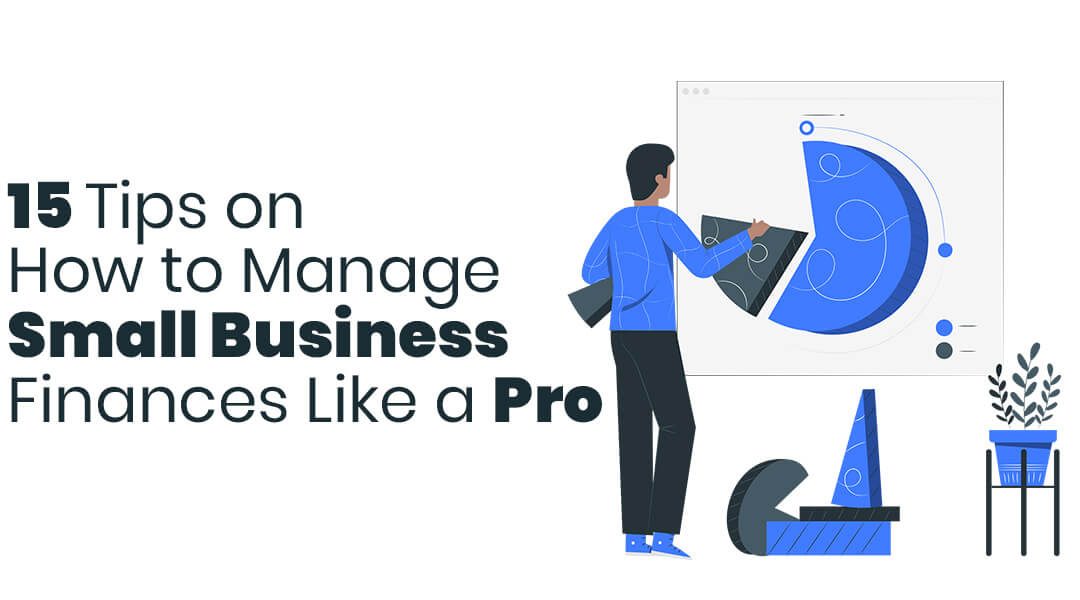So you want to manage your small business finances better? Looking for a way to create a stable financial future for your company? It’s not mission impossible, but you do need a place to start. That place is here.
Who Handles Money in a Business? — You
The default person responsible for managing company resources is its owner. In your case, that would be you. You may need help in the process, but the responsibility first and foremost falls on your shoulders.
Financial management is the pitfall many small business owners face and the unfortunate reason why many small businesses eventually fail. When you lack experience with managing business finances, you can easily slip into bad financial habits that can bury your business under piles of debt. The most important first step is to educate yourself and learn the essence of proper small business financial management. To help you master the art of managing your finances, we’ve compiled a list of 15 tips.
Shall we begin?
15 Tips for Better Small Business Financial Management
1. Find a Mentor You Trust
The best thing about needing help is that there’s always a way to find it for free. There are websites that connect business owners with mentors and educators free of charge. Having a mentor, someone you trust and has experience managing business finances is crucial for helping you understand the flow of money. Some of these resources include SCORE (a resource partner of the Small Business Administration, SBA), the Association of Small Business Development Centers, and MicroMentor.
2. Find a Local Credit Union
Unlike banks, credit unions are known for their willingness to provide loans to businesses, so finding the one that understands your needs won’t be as difficult. Since they are location-based, you’ll have to search for a local union. Most credit unions require membership in one of their affiliated organizations or have specific requirements for members, but all of that should be listed on their website.
Fortunately, there are tools that can help you find the right credit union for you. Some of them are Find a Credit Union, Credit Union National Association, and Credit Unions Online.
3. Consider Hiring a Bookkeeper
If you have zero experience managing business finances, it’s probably best to leave that to the professionals. Why is bookkeeping important, you might ask? It’s the backbone of any small business financial system. It represents the process of storing and organizing financial and accounting documents, such as ledgers, income tax records, journals, financial statements, and more.
Proper bookkeeping will help you manage the cash flow coming in and out of your company, as well as to analyze your business’ financial stability. Your bookkeeper will prepare the necessary reports which your accountant will later use to prepare your tax payments and tax returns. Plus, efficient bookkeeping will keep your company safe in the event of auditing, as you will have proper records that will help you avoid penalties and sanctions.
If hiring a bookkeeper isn’t something you’d be open to considering at this time, you can invest in a bookkeeping software instead. There are many options on the market, both with standard and customized features.
4. Look Into Accounts Receivable Financing
When it comes to small business financial management, many owners resort to the so-called accounts receivable financing option. Instead of waiting for a month to get your clients to pay their outstanding payments to your business, you sell those invoices to a factoring company that pays you the amount immediately minus a fixed factoring fee. Your clients then make the payment to the factoring company and not you.
This is a secure way to ensure uninterrupted cash flow coming into your business. Learn more about accounts receivable financing here.
5. Spread Out Your Tax Payments
This is more of a psychological ‘trick,’ but it’s proven to be quite efficient for many small businesses. Instead of treating tax payments like a quarterly financial obligation and struggling to save up in the last month before you have to pay, you can spread them out and make them monthly payments instead. That way, you can treat your taxes like a regular monthly operating expense.
6. It’s Good to Focus on Expenditure, but Don’t Forget About ROI
The best way to get a clear picture of how much you’re making on each investment is to measure your expenditure and ROI. Doing that will help you identify the investments that are beneficial for your business and those less profitable that you should let go.
When you’re just starting your small business, your main focus is probably on tracking where your money is going. That’s perfectly fine, but the real value of your expenses comes when you know how much money you’re making in return. Look at the ROI that comes with each expense to see what is and isn’t paying off.
7. Pay Yourself First
Many small business owners, especially at the beginning of the business, neglect to pay themselves, and try to put everything back into the company. It’s true that extra capital at the outset can go a long way in boosting growth, but it’s just as important to remunerate yourself and your work accordingly. Why is it important? Because if the business venture doesn’t work out in the end, you won’t have even paid yourself. It’s a double loss. You’re a part of the business as much as others, so you should remunerate your labor as much as you are doing for others.
8. Make a Separate Business Bank Account
Well, you probably don’t need us to explain why this is important, but we will nonetheless. This is ground zero when it comes to financial advice for business owners: you should always keep your personal and business finances separate. That way, you will be able to keep track of your private and company expenses. It’s also a smart way to avoid unexplained losses and tax headaches.
9. Use a Business Credit Card
Much like keeping a separate business bank account, you also need to use a credit card for your business expenses. There are some business cards that offer rewards for business-related spending, so be sure to research into that before choosing a provider.
10. Stay Frugal
Remember how in point 7 we said you should pay yourself first? Well, you should, but that doesn’t mean getting carried away. The benefits of owning a business may easily cloud your judgment. Remain frugal and keep your salary reasonable, as you do for your employees. What you save now will help you be more flexible in the future, especially if there are leaner months.
11. Be Careful When Expanding Your Business
Developing a business and expanding it over time is a marathon, not a sprint. This means, take your expansion slow and steady. Don’t take on unnecessary or unsubstantiated risks. Investing a lot of money in dynamic expansions can be a disastrous move from which you may not be able to recover.
12. Consider Renting Instead of Buying
In the beginning, you’ll probably be looking for ways to keep your maintenance costs to a minimum. Renting equipment instead of buying it can help cut your initial expenses while enabling you to be fully operational. You can rent your office space, too, especially if you plan on expanding or relocating in the near future.
13. Don’t Make Premature Expenses
Avoid cash flow blockage by not making premature expenses. Start with the absolutely necessary ones, and then reinvest as revenue starts coming in. Of course, you need business cards and marketing materials, but start small and expand with time. Make sure to set realistic marketing goals for your business as well. Will you get a website, who will manage your social media, do you have profiles in business directories? These are just a couple of important questions to ask yourself in the beginning.
14. Establish Good Financial Habits
When it comes to business finances, that’s probably the most basic yet difficult thing to achieve. The good way to start is by setting up internal financial protocols. For example, you can start your day with a 20-minute review and update of financial information. If you repeat it long enough, it will become a habit, and it won’t feel like a forced effort anymore. Small business owners often are strapped for time, but actively making room in your day for your finances can go a long way to help you spot problems early on, as well as to prevent risk or fraud.
15. Plan Often & Plan Ahead
The question of how to manage small business finances has a simple answer. Don’t get stuck in today and tomorrow only. Make a long-term financial strategy that includes projected ROI and expenses. Be wise about planning, and set realistic goals that you can realistically achieve.
How to Manage Small Business Finances: Conclusions
Dealing with business finance is a tricky job, especially if you’re new to business management in general. The most important aspect of small business financial management is keeping your personal and company finances separate. That means, separate bank accounts and credit cards. Don’t be afraid to ask for help with bookkeeping if you have to, and plan your future expansions, financial obligations, and expected ROI well in advance.
Stay tuned for our next topic!
—————————————————————————————————————————————————————————————————————————————————
Illustrations Source – www.freepik.com


















